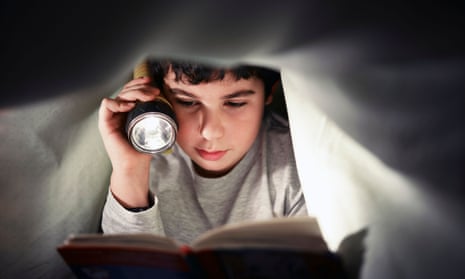The fictional children of the past frolicked on the heather-clad slopes of Kirrin Island or battled the armies of evil at Hogwarts, free from the restrictions of their parents. Today, according to the judge of a children’s books prize, novelists are eschewing adventure stories for “claustrophobic” domestic dramas and creating “a depressing children’s literary landscape” in the process.
Author Philip Womack and his fellow judges read 60 books to come up with the shortlist for the Branford Boase award, which rewards children’s authors at the start of their careers and has honoured names from Meg Rosoff to Mal Peet in the past. According to Womack, at least a third of the submissions this year had a “very similar narrative: there’s an ill child at home, who notices something odd, and is probably imagining it, but not telling the reader. They’re all in the first person, all in the present tense, all of a type,” he said.
“There are some adventure stories around today, but they tend not to be debuts. Most of these stories tend to be so enclosed, so claustrophobic, so depressing and formulaic. It seems to me to be rather a worrying new trend,” he said. “While each had its own merits, it became clear that there was a formula, and – which is my own opinion, and not necessarily that of the other panellists – it does make for a rather depressing children’s literary landscape.”
His fellow judge Julia Eccleshare, co-founder of the award and children’s director of the Hay festival, expressed a similar view, pointing to the “huge predominance” of domestic dramas submitted for the prize. “Children’s adventure it seems has become internal, the setting no longer the outside world but frequently the family, with narrative tension and action arising from issues such as mental health and individual trauma,” she said.
Writing in the Bookseller magazine, Eccleshare said the increasing lack of freedom for children to be outside alone in real life correlates to a dwindling of fictional adventure stories, which this year “seemed almost to have disappeared from new novels”.
The £1,000 Branford Boase prize, for the most promising book for seven-year-olds and upwards, steered away from small-scale domestic stories in its shortlist, going for adventures like Yaba Badoe’s A Jigsaw of Fire and Stars, in which a girl who is washed ashore in a treasure chest grows up to join the circus, and Sharon Cohen’s The Starman and Me, pitched as “ET meets Stig of the Dump”.
Quick GuideFive of the best adventure stories, as recommended by Tales on Moon Lane bookshop
Show

Children of Blood and Bone by Tomi Adeyemi (Young adult)
A fantasy adventure that combines stunning prose, brilliant pacing and epic scale to make this one of the must read books of 2018. The main character's mission sees her constant hope of a better future tested against the ultimate sacrifice she must give to achieve that future. This is fantasy, adventure and so much more; gripping and enlightening.
Brightstorm by Vashti Hardy (9-12)
When news reaches twins Maudie and Arthur that their father has died while on an expedition to reach the South Polaris, they are heartbroken. When someone then tries to say their father was cheating, they are completely devastated and desperate for justice. The twins join forces with Harriet Culpepper, an intrepid explorer, to be the first to reach the South Polaris and clear their father's name. A cracking adventure.
The Polar Bear Explorers' Club by Alex Bell (9-12)
Stella is told she can't be an explorer because she is a girl, which is obviously ridiculous - and thankfully, her adoptive father agrees, whisking her away on her first exhibition. In the spirit of great adventure stories, everything begins to go wrong when the group is split up and four children are forced to fend for themselves. Who can resist the perfect combination of magic, mayhem and moustache wax?
The Girl Who Walked on Air by Emma Carroll (9-12)
Carroll's vibrant writing echoes the likes of Noel Streatfield, while the fresh, brilliantly drawn characters jump of the page to become excellent fellow explorers – and possibly life-long friends, as these books will stay with you long after you have put them down.
Mr Penguin and the Lost Treasure by Alex T Smith (7-9)
'Indiana Jones meets Hercule Poirot' is how the publishers describe this lively new series, which is full of slapstick humour, mystery and adventure. The series is perfectly pitched for developing and newly fluent readers, with striking black and orange illustrations throughout.
- Tamara Macfarlane of Tales on Moon Lane bookshop in London
For Womack, small-scale dramas, focusing on illness or disability, can be done well – he pointed to titles including Mark Haddon’s The Curious Incident of the Dog in the Night-Time, and RJ Palacio’s Wonder – but “in order to write this kind of narrative you need to be very skilful and I just think the problem is that publishers and authors maybe imagine that if you give a character an illness, they will be sympathetic”.
“It’s become a trope – something people do because they think that’s what a book should be,” he said. What authors should be doing instead, he argued, is presenting readers with “worlds the child can explore”.
“I do worry it is a general societal trend – more inwards, more restrictive of the child’s movements, more focused on the self … The narrative itself becomes very closed and incremental and slow because you’re limited by what the child can see,” he said.
Eccleshare described the domestic dramas as “a new kind of adventure which depends on interaction rather than action”.
“Today’s fictional children are being faced with problems that have no such simple resolution. Many deal with things going wrong in families: family breakdown, accidents, deaths, mental health problems from depression and addiction to borderline personality disorders, all of which it will be impossible for a child to resolve as the issues are insurmountable,” she said.
Children’s bookseller Tamara Macfarlane, of the shop Tales on Moon Lane, attributed the shift in emphasis to a wider focus on mental health. “There has been a shift towards more internal narratives and exploring the internal journey,” she said. “It’s a tricky one to handle. In most of the great children’s books, the first thing you do is get rid of the parents so the children can have an adventure. I hope it’s not a reflection of the claustrophobic nature of the times, with everything being a bit over-monitored and over-measured and over-controlled, and the lack of freedom children have now in terms of getting out of the house and escaping.”
The winner of the 2018 Branford Boase prize will be announced on 4 July at a ceremony in London.
The 2018 Branford Boase prize shortlist
A Jigsaw of Fire and Stars by Yaba Badoe (Head of Zeus)
The Starman and Me by Sharon Cohen (Quercus Children’s Books)
Fish Boy by Chloe Daykin (Faber)
Knighthood for Beginners by Elys Dolan (Oxford)
Kick by Mitch Johnson (Usborne)
Potter’s Boy by Tony Mitton (David Fickling Books)
The City of Secret Rivers by Jacob Sager Weinstein (Walker Books)

Comments (…)
Sign in or create your Guardian account to join the discussion